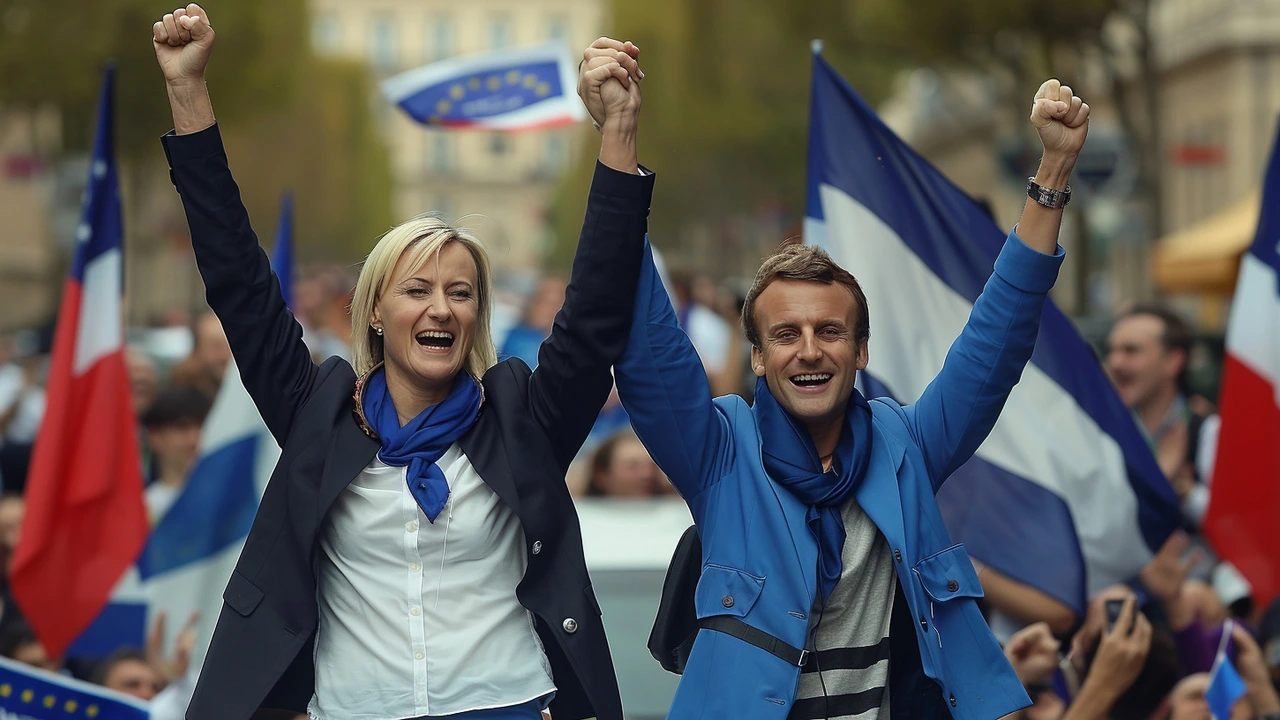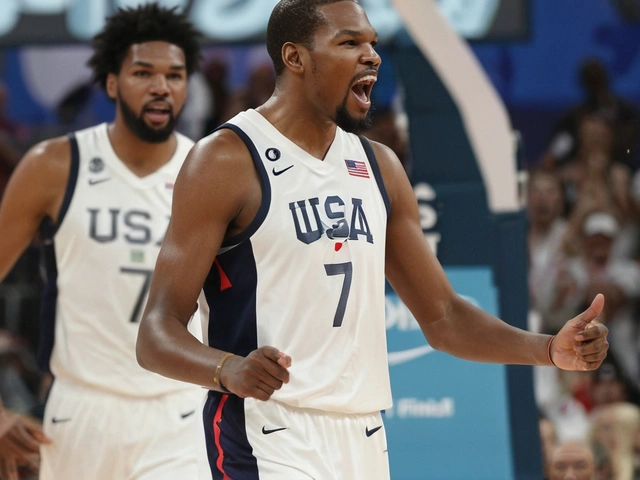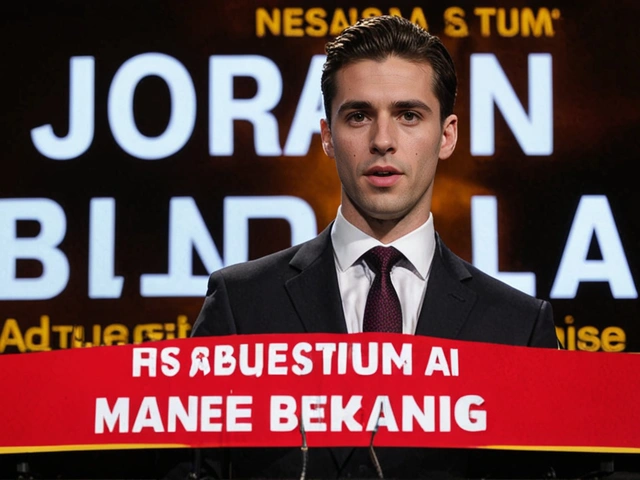France's Political Landscape Shifts as National Rally Surges
In a decisive and unexpected turn of events, Marine Le Pen's far-right National Rally (RN) party has made historic gains in the latest European elections. Securing 31.5% of the vote, the RN surpassed President Emmanuel Macron's Renaissance party, which could muster only 15.2%. These results indicate a remarkable eight-point increase for the National Rally compared to the 23% it achieved in the 2019 elections. Conversely, Macron's Renaissance party saw a significant decline from the 22% it captured in the previous election cycle.
The election outcomes have sent shockwaves through the French political landscape and European capitals. President Emmanuel Macron, addressing the pressing results, announced the dissolution of the national assembly. He warned that the growing influence of nationalists and demagogues is not just a threat to France but to the entire European Union. The implications of this election are profound, underscoring the shifting political currents across Europe and the rising tide of far-right sentiment.
National Rally's Unprecedented Success
Jordan Bardella, the leader of the National Rally, responded to the results with a sense of humility and gravity. For Bardella, the clear message conveyed by the electorate is a call for change in the direction of the European Union. With these historic gains, the RN now possesses substantial leverage to influence both national and European policy. The surge in support can be attributed to multiple factors, ranging from dissatisfaction with Macron's policies to a broader disillusionment with the European Union's handling of economic and migrant issues.
The RN's success highlights the increasing appeal of nationalist and Eurosceptic ideologies within France and across Europe. Voters appear to be drawn to the party's promises of stronger national sovereignty, stricter immigration control, and protectionist economic policies. These themes resonate particularly well among voters who feel left behind by globalization and marginalized in the contemporary political discourse.
Macron's Decline and Response
For Emmanuel Macron, the election results are a stark repudiation of his leadership and the policies pursued by his Renaissance party. The drop from 22% to 15.2% in the vote share is indicative of growing discontent among the French electorate. Macron's ambitious reform agenda, often criticized as favoring the elite, has faced resistance from various quarters, including labor unions and the working class. The decline in support for Macron's party reflects a broader trend of waning confidence in the centrist, pro-European establishment.
In his address following the election results, Macron emphasized the dangers posed by the rise of nationalist and demagogic forces. By dissolving the national assembly, he aims to counter the growing influence of the far-right. However, this move also demonstrates the considerable challenges he faces in navigating the current political climate. Macron's call for unity and a renewed commitment to European integration will need to resonate deeply if he is to reclaim lost ground and stave off the nationalist surge.

Diverse Reactions from the Political Spectrum
The election results were met with varied reactions from different political factions. The left-wing Place Publique, which received 14% of the votes, expressed concern over the far-right's gains but also saw the need for a stronger progressive alliance to counteract the RN's influence. Similarly, La France Insoumise, which garnered 8.7%, stressed the importance of social justice and inclusive policies in addressing the concerns of disenfranchised voters.
The Republicans, with a 7.2% vote share, acknowledged the shift in the political landscape and called for a re-evaluation of their strategy to remain relevant. Reconquête, receiving 5.5%, and The Greens, capturing 5.2%, both emphasized the need for comprehensive responses to the pressing challenges of climate change and economic inequality.
The Wider European Context
The implications of the French election results extend beyond the national borders. Throughout Europe, there is a growing sentiment of Euroscepticism and a push towards nationalist policies. The success of the National Rally is emblematic of this broader trend. From Italy to Hungary, and from Poland to the UK, parties with similar ideologies are gaining traction. This shift suggests a re-evaluation of the European Union's future and the policies that have shaped it thus far.
The European Union, grappling with issues such as migration, economic disparities, and nationalist movements, finds itself at a crossroads. The rise of far-right parties in such pivotal member states challenges the principles of unity and cooperation that the EU is built upon. Observers and analysts are now closely monitoring how the European Parliament and the European Commission respond to these developments. The balance of power within these institutions may shift, influencing key policy decisions in areas like trade, immigration, and environmental regulation.
The Road Ahead for France
In the wake of these landmark election results, France faces a critical juncture. The political landscape is more fragmented than ever, with a palpable sense of uncertainty about the future direction of both national and European policies. While the National Rally celebrates its historic gains, the nation must grapple with the implications of increased nationalist influence.
For Macron and the Renaissance party, this period marks a time of reflection and recalibration. Adapting to the new political reality, addressing the grievances of voters, and finding ways to bridge divides will be imperative. The dissolution of the national assembly is just the beginning of a series of strategic moves aimed at countering the far-right's rise. Macron's ability to navigate these turbulent waters and restore faith in centrist, pro-European values will define his legacy and the future trajectory of France.
As the dust settles, the world watches closely. The results of the French European elections serve as a microcosm of broader geopolitical shifts, reflecting the challenges facing contemporary democracies. The road ahead is fraught with complexities, but it is also a critical opportunity for French and European leaders to address the underlying issues driving the electorate's choices and to safeguard the ideals of unity, democracy, and progress.





Comments
Wow, the surge for the National Rally is really shaking up the political scene. It looks like a lot of French voters are desperate for change, and this could be an opportunity for fresh ideas to emerge. Even if the right‑wing rhetoric is concerning, there’s a chance to steer the conversation toward constructive solutions. Let’s hope the upcoming elections bring more dialogue rather than division. The future can still be bright if citizens stay engaged and keep demanding accountability.
The recent European vote in France serves as a vivid illustration of how democratic mechanisms can both reflect and amplify societal undercurrents. When citizens feel that established parties have failed to address their daily hardships, they often turn toward movements that promise decisive action. In the case of the National Rally, the appeal lies not just in nationalist slogans but also in a broader narrative of reclaiming agency over one’s own destiny. This narrative resonates especially with those who feel marginalized by globalization’s relentless pace and the perceived erosion of cultural identity. Moreover, the economic anxieties stemming from inflation, unemployment, and precarious work have created fertile ground for political messages that promise stability. The surge, however, should not be interpreted solely as an endorsement of extremism; rather, it highlights a profound disillusionment with the status quo. Such disillusionment can be a catalyst for necessary reforms, provided that it is channeled through inclusive dialogue rather than exclusionary policies. It is crucial for the centrist forces to listen deeply to the grievances that have propelled this shift, acknowledging that security and economic certainty are not luxuries but fundamental concerns. At the same time, the rise of far‑right sentiment must be met with robust defenses of democratic values, ensuring that pluralism remains intact. History teaches us that societies that ignore the voices of the discontent risk polarizing further and entrenching divisions. Therefore, the current political landscape offers an opportunity for all parties to re‑evaluate their platforms, to be more transparent, and to propose tangible solutions. Engaging young voters, who are often the most progressive, can also counterbalance the momentum of reactionary forces. Investment in education, social safety nets, and fair migration policies can address many of the root causes that feed populist narratives. Ultimately, the health of French democracy will depend on the ability of its citizens and leaders to transform frustration into constructive participation. If that transformation occurs, the seemingly historic gains for any single party may become a stepping stone toward a more resilient, inclusive Europe.
The data is a glaring reminder that populist pandering can derail rational policy. Voters swapping nuanced debate for slogans signals a dangerous regression. Macron’s centrist project looks weak when half the electorate feels alienated. This isn’t progress; it’s a step back into tribalism. The EU will have to grapple with more of the same noise.
Man the French scene is on fire – a wild ride that mixes hope and fear all in one breath it’s like watching a fireworks show that never ends
Thx for the update its clear the politcs in france are realy shifting hopefull that folks stay calm and dont let the angry vibes take over
Exactly! It’s crazy how fast things can change 😂 Let’s keep the convo positive and support each other 🙌
While the results are certainly concerning, it remains essential to uphold the principles of democratic discourse and to engage with differing viewpoints respectfully.
Important to note that the EU has mechanisms to address extremist trends – such as increased funding for civic education and cross‑border dialogue 😊 Stay informed and keep sharing reliable sources!
Oh great, just what we needed – another wave of melodrama to spice up the already thrilling saga of European politics, because nothing says “stability” like a resurgence of nationalist hype.
Nothing surprising here.
Allow me to dissect the melodramatic veneer you so effortlessly parade. The resurgence of nationalist sentiment is not a mere theatrical flourish but a symptom of deep‑seated economic disenfranchisement. When citizens encounter stagnant wages and soaring living costs, they gravitate toward parties that promise swift, decisive action. Your flippant dismissal overlooks the legitimate grievances that fuel this shift. Moreover, the EU’s bureaucratic inertia exacerbates feelings of alienation among peripheral regions. The narrative that these movements are purely irrational fails to acknowledge the systemic failures that have paved the way for their appeal. By reducing complex socio‑political dynamics to “drama,” you contribute to the very trivialization that hinders constructive debate. It is incumbent upon observers to examine policy shortcomings, not merely mock the emotional reactions of the electorate. In short, the phenomenon warrants rigorous analysis rather than snide commentary. Perhaps a more nuanced perspective would serve the discourse better.
One must recognize that the electorate’s turn toward the National Rally is a manifestation of intellectual elitism collapsing under the weight of uninformed masses, a tragic yet inevitable decline of sophisticated political engineering.
Behold, the stage of French politics is set ablaze, and we, mere spectators, are destined to witness the tragic rise of a force that promises order yet sows chaos; may the annals remember this flamboyant crescendo.
I appreciate the diverse viewpoints shared here and hope we can continue to discuss the implications calmly, focusing on factual information and mutual respect.
Observing the French electoral shift is a study in political realignment devoid of superficial sentiment